Palm Springs resident takes on 545-mile bike ride to raise funds for HIV/AIDS
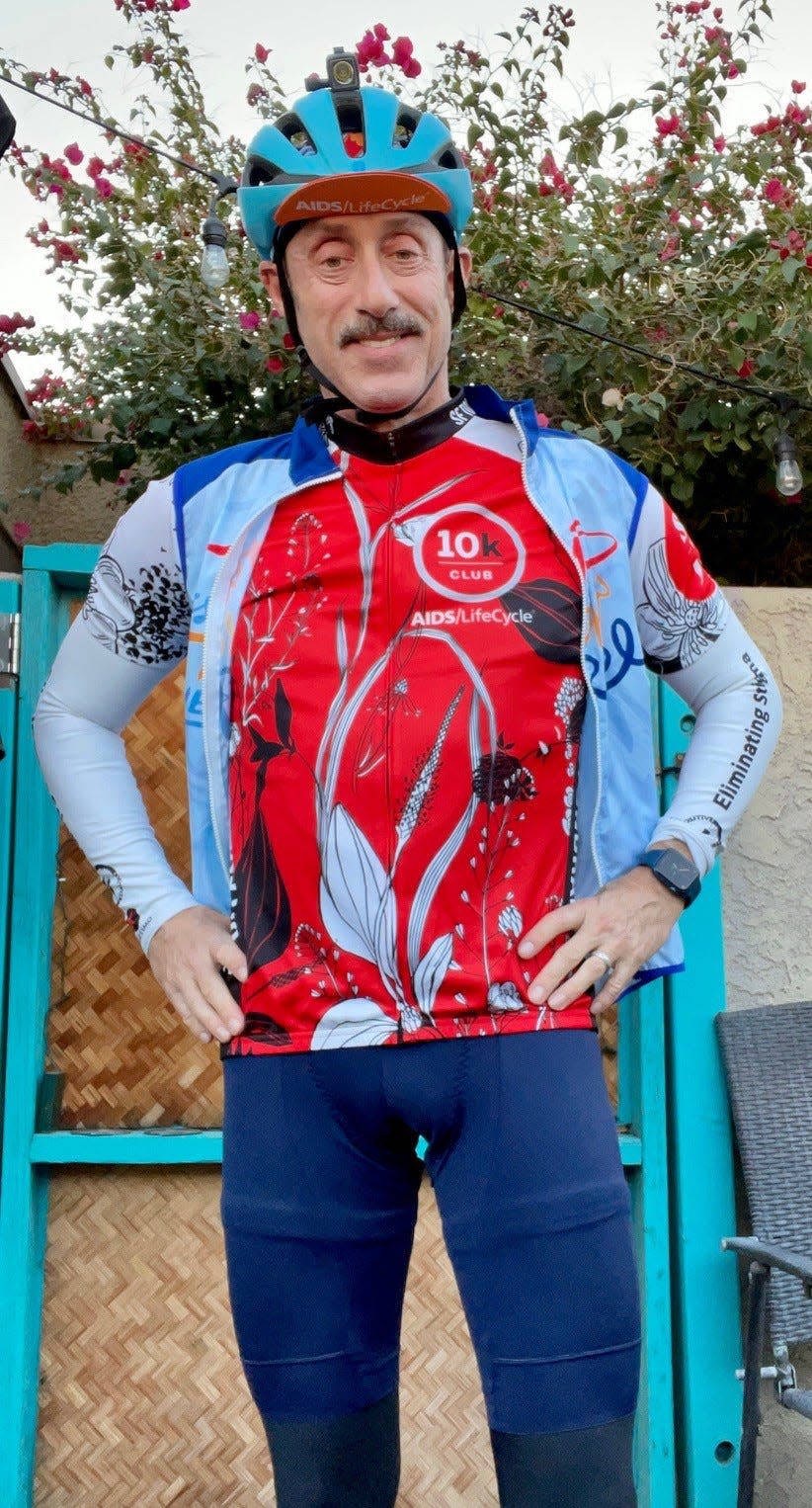
Palm Springs resident Brett Klein decided to celebrate one last hurrah 22 years ago — in the form of a 545-mile bike ride.
He had been diagnosed with HIV seven years prior, and with his health declining, Klein thought participating in the California AIDS Ride would be a great way to challenge himself and support others living and aging with HIV/AIDS.
Now called AIDS/LifeCycle, the event is a seven-day, 545-mile bike ride from San Francisco to Los Angeles benefiting the San Francisco AIDS Foundation and the Los Angeles LGBT Center. The goal is to raise awareness of HIV/AIDS and fund various services such as HIV testing, prevention and care.
Since the creation of the event in 1994, more than $300 million has been raised for HIV and AIDS-related services offered at the two centers.
"It was in Century City on Avenue of the Stars and they closed it all down and you literally rode in as music was blaring," Klein recalled of getting to the finish line. "It's this magical accomplishment at the end of your week."
Much to Klein's surprise, it wasn't his last hurrah. Now, 22 years later, he's getting back on the bike again from Sunday through June 11 with several other Coachella Valley residents as part of the Desert Roadrunners team. So far, Klein has raised more than $26,000 individually, and the Desert Roadrunners have raised more than $291,000.
Pushing himself near the limit
Things have changed drastically with HIV and AIDS medications, support and compassion since Klein was diagnosed.
HIV, which stands for human immunodeficiency virus, is a virus that attacks cells that help the body fight infection. If left untreated, it can lead to AIDS, or acquired immunodeficiency syndrome.
Klein said he was closeted and bisexual in his early 30s. At the time, he was an athlete and was taking 1,600 milligrams of ibuprofen every day. Certain medications, such as ibuprofen, can thin blood which often increases bleeding. Klein experienced bleeding gums.
Around Memorial Day weekend in 1993, following a routine HIV test, Klein called his doctor's office to learn of the results. Devastating news was delivered to him in a less-than-compassionate way.
"It literally was talking to a nurse on the phone, and I said I haven't gotten my results yet. She says, 'Oh yeah, your doctor says you're positive,' and 'Oh yeah, we can't see you anymore. Have a good weekend, here's a number to call,'" Klein said.
The chance someone will get HIV from oral sex with an HIV-positive partner is extremely low, according to the Centers for Disease Control and Prevention. But several factors may increase that risk, such as sores in the mouth or bleeding gums.
Fear was at an all-time high during this point in the HIVS/AIDS epidemic. From 1981 through 1990, there were 100,777 AIDS-related deaths reported to CDC. Medications for those who were HIV-positive were also scarce and often caused other health issues.
Understandably, Klein thought he would just end up being part of that death toll within a matter of months. He quit a job that he loved, visited family and friends for what he thought would be the last time and accepted his fate.
Except the path didn't lead to a grim outcome. Friends connected him to the Los Angeles LGBT Center, where he found compassion from health care professionals and resources that he needed.
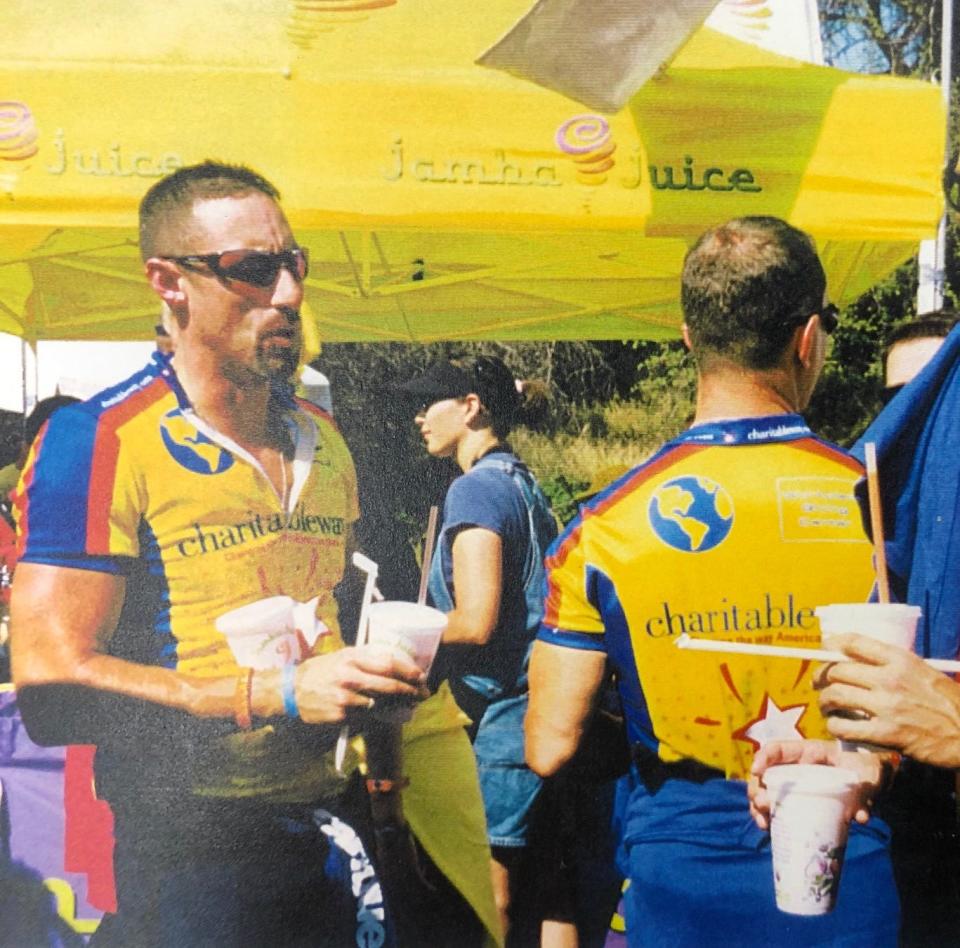
In 1999, Klein, after learning about the AIDS Ride, decided to volunteer as a "roadie." The days were tough — often 15 to 20 hours long — but he enjoyed every moment, especially hearing people's stories during the weeklong journey.
Some have stuck with him decades later, including a conversation he had with a young woman in her 20s. She was "distraught" that she had to be on the shuttle bus because she physically could not ride that morning, Klein said, and he tried to console her.
"She had been living on the streets. When she tested positive, she had abandoned her family, her family did not abandon her, thinking she needed to isolate and be away from everybody," Klein recalled.
But after a few years, she reconciled with her family and decided to participate in the ride. Additionally, she got her family involved too: Her mother and father worked the food line, her sister and brother worked in the camp area as volunteers, and her grandparents followed her on her route.
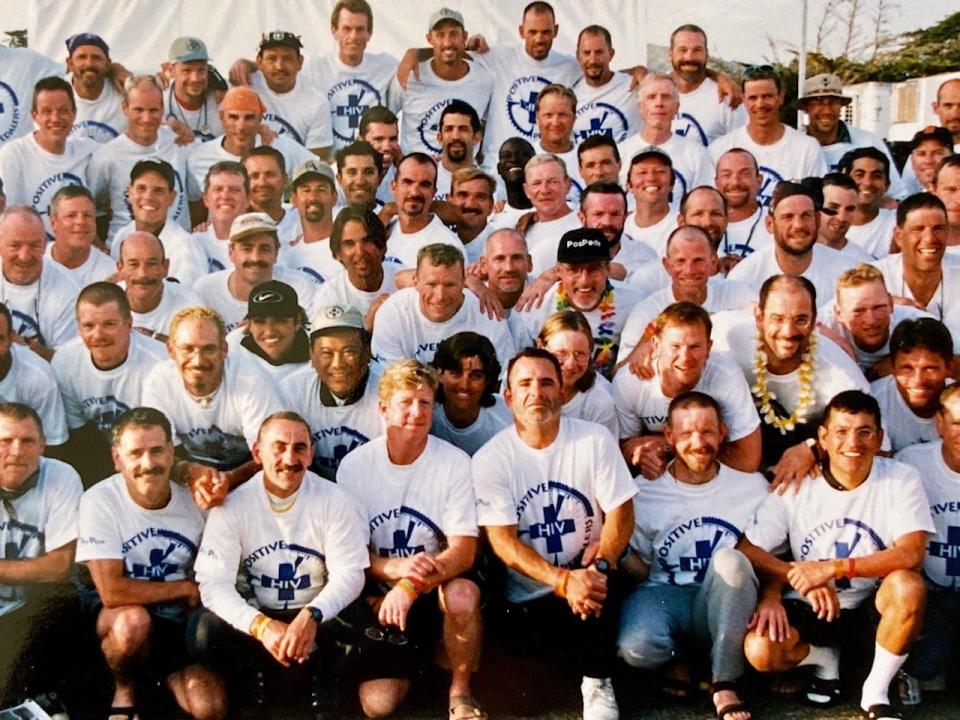
"It really struck me as, 'Wow, I've actually been pretty blessed in the sense of my health and even being here,'" Klein said.
Seeing the ride so close and how much it meant to people ultimately pushed him to ride it himself in 2000. However, his health was not entirely on his side. Klein had a low platelet count due to harsh medications. A low platelet count increases one's risk of hemorrhage or severe bleeding, so if Klein injured himself during the ride, it could have had potentially life-threatening consequences.
But thinking it was his last hurrah, he decided to go for it.
"You have your days when you're so exhausted and you still have 20 miles to go, but you're surrounded by what we call a 'love bubble,'" Klein said of the journey. "You bonded with people, you talked to the person behind you in the food line, at the porta-potty, at the restaurant where you're all exhausted, look like crap and you're wearing the same thing for seven straight days."
Crossing the finish line was a surreal and accomplishing moment for Klein. A few months later, he had his spleen removed, which helped reverse health concerns related to platelet counts.
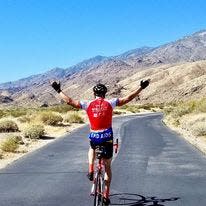
'Live a great story'
A few days ahead of his second ride, Klein said he was feeling "very anxious" and "exceedingly bitchy."
Klein initially planned to take on the AIDS/LifeCycle ride in 2020 to celebrate the 20th anniversary of his first one, but the COVID-19 pandemic canceled the ride. This year still holds special weight as he'll be celebrating the tail end of his 60th birthday, and the event serves as a motivational tool to "push me into the next 20 or 30 years," he said, as well as allow him to remember the journey he has been on.
But before all of that happens, he first has to show a negative COVID-19 test, which has made him feel a little on edge lately. On Tuesday, he said he was isolating from others and wearing a face mask whenever he went out. Even though that has been a stressful component, he said he was "hyper excited about the fun and excitement of the week."
To get to this moment, Klein has trained for about 10½ months, and it hasn't been easy. He had a bike accident about two years ago that resulted in eight broken ribs, a broken clavicle and several months of rehabilitation. During training, Klein had to regain his strength and get himself back in shape in order to endure several miles of riding each day.
He also had to be very mindful of how his body was doing on any given day due to medications he was taking, food and water intake, heat and upwards of eight to 10 hours of riding.
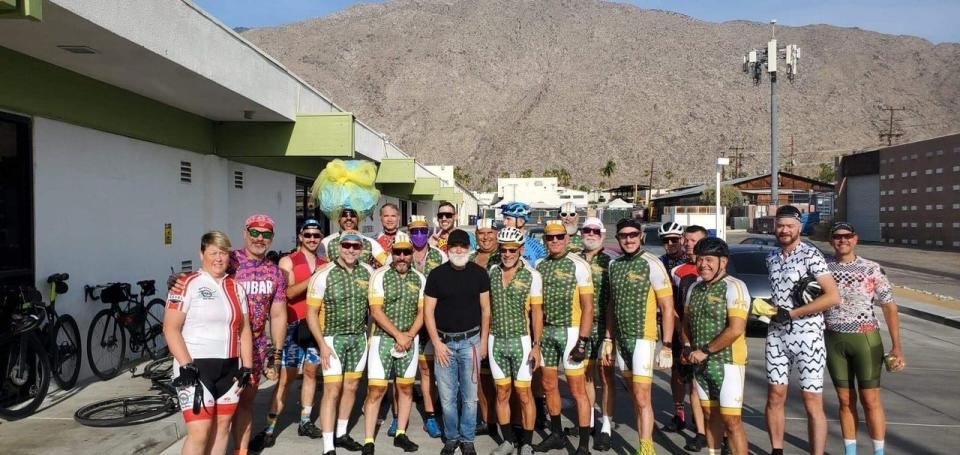
Nevertheless, he has kept a positive attitude throughout it all.
"I'm here today, doing what I'm doing," Klein said, "and yes, I'm more tired, but you learn as we get older that with any challenge you have, you say, 'OK, I'm just going to do my best.'"
Along the way, he has been able to raise funds for a cause he cares deeply about. During his first ride in 2000, Klein raised $5,000, which he couldn't believe. Now in 2022, he surpassed his original goal of $10,000 and even his second goal of $25,000.
Donations can still be made to Klein or any of the Desert Roadrunners members by clicking on a rider's name at https://tinyurl.com/2p89dhnu.
Klein has a lot of goals as he embarks on his second ride. First and foremost, he wants to get through every single mile. Every day will be different and tough: On the first day, he was riding 82 miles from San Francisco to Santa Cruz, followed by a 109-mile journey to King City the next day. The journey concludes June 11 at Fairfax High School in Los Angeles.
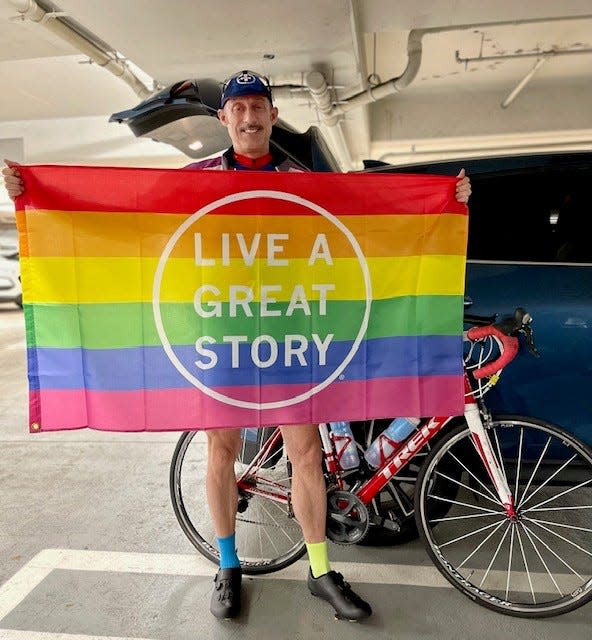
But most importantly, he wants to "live a great story." On his first ride, he was so determined to make the miles each day that he "didn't take in the beauty of the ride," he said. This time around, he wants to talk to more people, spend more time at various pit stops along the way, including an iconic artichoke stand, and watch musical numbers.
"I want to be exhausted and realize that I've lived it that day," Klein said.
Ema Sasic covers health in the Coachella Valley. Reach her at ema.sasic@desertsun.com or on Twitter @ema_sasic.
This article originally appeared on Palm Springs Desert Sun: Palm Springs man bikes 545 miles on AIDS/LifeCycle to raise funds

